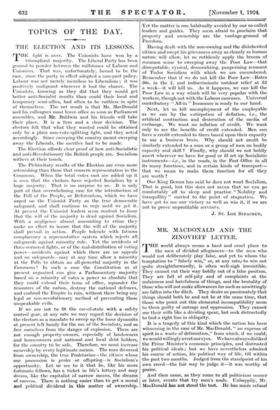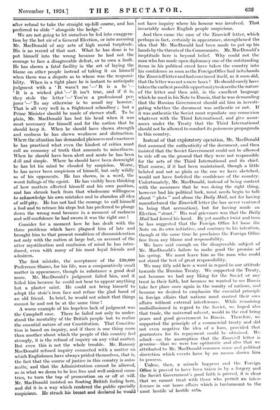MR. MACDONALD AND THE ZINOVIEFF LETTER.
THE world always seems a hard and cruel place to the men of divided allegiances—to the men who would not deliberately play false, and yet to whom the temptation to " falsely win," or, at any rater to win not quite straightforwardly, is often well-nigh irresistible. They cannot cut their way boldly out of a false position. They are full of self-pity and of complaints at the unfairness and hatefulness of things, and the brutality of those who will not make allowances for such as unwittingly are fallen into the ditch. They desire so passionately that things should both be and not be at the same time, that those who point out this elemental incompatibility seem to them guilty of outrage and oppression. They cannot use their wills like a dividing spear, but seek distractedly to find a right line in obliquity.
It is a tragedy of this kind which the nation has been witnessing in the case of Mr. MacDonald, " an expense of spirit in a waste of defamation," from which, if we could, we would willingly avert our eyes. We have always disliked the Prime Minister's economic principles, and distrusted his political ideals ; but we have 'nevertheless admired his course of action, his political way of life, till within the past two months. Judged from the standpoint of his own creed—the fair way to judge it—it was worthy of praise.
And then came, as they come to all politicians sooner or later, events that try men's souls. Unhappily, Mr. MacDonald has not stood the test. He has made refusal 'after refusal to take the straight up-hill course, and has preferred to slide " alongside the hedge."
We are not going to let ourselves be led into exaggera- tion by the hot air of a General Election, or into accusing Mr. MacDonald of any acts of high moral turpitude. His is no record of that sort. What he has done is to put himself into the wrong because he had not the courage to face a disagreeable defeat, or to own a fault. He has shown a fatal facility in the art of laying the blame on other people instead of taking it on himself when there was a dispute as to whose was the responsi- bility. When in a tight place he is instant to anticipate judgment with a ' It wasn't me It is a lie '- ` It is a wicked plot It isn't true, and if it is, they stole the letter '—` You're a professional per- jurer To say otherwise is to assail my honour.'
That is all very well in a frightened schoolboy ; but a Prime Minister should be made of sterner stuff. To be plain, Mr. MacDonald has lost his head when it was most necessary for himself and for the nation that he should keep it. When he should have shown strength and coolness he has shown weakness and distraction.
Where the situation has demanded plainness and exactness he has practised what even the kindest of critics must call an economy of truth that amounts to miserliness.
When he should have been alert and acute he has been dull and simple. Where he should have been downright he has let his mind be clouded by suspicion. Worse, he has never been suspicious of himself, but only wildly so of his opponents. He has shown, in a word, the worst failings of the egoist. He has visibly been thinking of how matters affected himself and his own position, and has shrunk back from that wholesome willingness to acknowledge his own mistakes and to abandon all idea of self-pity. He has not had the courage to call himself a fool and _to retrace his steps but has preferred to plunge down the wrong road because in a moment of rashness and self-confidence he had- sworn it was the right one!
Consider for a moment how he has dealt with the three problems which have plagued him of late and brought him to that present condition of disconsideration not only with the nation at large but, on account of the utter mystification and confusion of mind he has intro- duced, even with many of his most loyal friends and admirers.
The first mistake, the acceptance of the 130,000 Preference Shares, for his life, was a comparatively small matter in appearance, though in substance a good deal more. Mr. MacDonald's judgment failed him, and it failed him because he could not bear to appear anything but a plaster saint. He could not bring himself to adopt the stoic's iron face and refuse the glad hand of an old friend. In brief, he would not admit that things cannot be and not be at the same time I A worse example of his hopeless lack of judgment was the Campbell case. There he failed not only to under- stand the mentality of the British people but to realize the essential nature of our Constitution. That Constitu- tion is based on inquiry, and if there is one thing more than another about which the people of this country feel strongly, it is the refusal of inquiry on any vital matter. But even this is not the whole trouble. Mr. Ramsay MacDonald refused inquiry connected with a matter on which Englishmen have always prided themselves, that is, the fact that the course of justice in this country is auto- matic,- and that the Administration cannot be allowed, as in what we deem to be less free and well ordered coun- tries, to turn the tap of prosecution on or off at will. Mr. MacDonald insisted on flouting British feeling here, and did it in a way which rendered the public specially suspicious. He struck his breast- and declared -he would not have inquiry where his honour was involved. That invariably makes English people suspicious.
-And then came the case of the Zinovieff letter, which perhaps in fact, certainly in appearance, strengthened the idea that Mr. MacDonald had been made to put up his hands by the threats of the Communists. Mr. MacDonald's ineptitude here is beyond belief. Why could not the man who has made open diplomacy one of the outstanding items in his political creed have taken the country into his confidence as soon as the Foreign Office had in its hands the Zinovieff letter and had convinced itself, as it soon did, that the letter was not a mere hoax ? He should surely have taken the earliest possible opportunityto describe the nature of the letter and then add, in the excellent language which he used in his Note to Russia, that he was demanding that the Russian Government should aid him in investi- gating whether the document was authentic or not. If it was authentic the Soviet must repudiate any connexion whatever with the Third International, and give assur- ances under the Treaty that the Third International should not be allowed to conduct its poisonous propaganda in this country.
Instead of that exploratory operation, Mr. MacDonald first assumed the authenticity of the document, and then insisted that the Soviet Government could not be allowed to ride off on the ground that they were not responsible for the acts of the Third International and its chief. That course, if it had been maintained, though a little belated and not so plain as the one we have sketched, would not have forfeited the confidence of the country. Unfortunately, Mr. MacDonald, instead of being content with the assurance that he was doing the right thing, however bad his political luck, must needs begin to talk about " plots " and abuse the Daily Mail, not for having manufactured the Zinovieff letter (he has never ventured to bring that accusation), but for having made an Election "stunt." His real grievance was that the Daily Mail had forced his hand. By yet another twist and turn he has suggested that the Foreign Office let loose the Note on its own initiative, and contrary to his intention, though at the same time he proclaims the Foreign Office free from any blame and responsibility.
We have said enough on the disagreeable subject of Mr. MacDonald's failure to make good the promise of his spring. We must leave him as the man who could not stand the test of great responsibility. • We may fitly 'add here a word in regard to our attitude towards the Russian Treaty. We supported the Treaty, not because we had any liking for the SoN iet or any trust in their faith, but because we wanted to see Russia take her place once again in the comity of nations, and because we desired to emphasize the essential principle in foreign affairs that nations must control their own affairs without external interference. While remaining undisillusioned in regard to the Soviet, we hoped also that trade, the universal solvent, would in the end bring peace and good government to Russia. Therefore, we supported the principle of a commercial treaty and did not even negative the idea of a loan, provided that guarantees for its repayment could be obtained. We admit—on the assumption that the Zinovieff letter is genuine—that we were too optimistic and also that we attributed to Mr. MacDonald common sense and political discretion which events have by no means shown him to possess.
Unless, then, a miracle happens and the Foreign Office is proved to have been taken in by a forgery and the Soviet Government's good faith is proved, it is clear that we cannot treat with those who permit an inter- ference in our home affairs which is tantamount to the - most -hostile-of hostile acts.











































 Previous page
Previous page